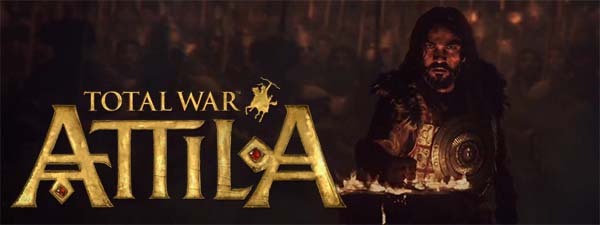
A few months ago, I posted an article outlining some suggestion for unique civilization themes and abilities for a possible Sid Meier's Civilization VI game. In it, I proposed a unique characteristic for the Huns or Mongolians: that they be a true nomadic empire. The idea was that they would have traveling cities that allowed them to move their empire with their army and essentially occupy any unclaimed territory or territory vacated by defeated rivals. Well, the Creative Assembly had already beaten me (and Firaxis) to the punch with Total War: Attila (and apparently Firaxis is embracing the idea with Beyond Earth's first expansion). Total War: Attila has a feature almost identical to what I had conceived for the Huns and Mongolians in Civilization. I'm a fan of the Total War series as is, so I was going to play this game for sure. Of course, Creative Assembly running with an idea that I had independently conceived of only made me more curious to play the game.
Attila acts as sort of a sequel to Rome II. While that game was all about building up the Roman empire (or whichever empire you happened to select), Attila is all about tearing down those empires. But this is a fully stand-alone game (like Napoleon Total War was to Empire Total War), and does not require Rome II in any way.
Learning how to be a horde
The Prologue campaign in this game is brutal! It's like a Demon's Souls tutorial that is designed to kick your ass. I restarted it once before realizing that it was designed for the player to fail in order to teach the new migration feature.
This prologue acts as a tutorial for the new features and mechanics of the game, but it doesn't do a particularly good job of teaching these mechanics. It also doesn't go into much detail of the established features of the franchise (other than telling you that a feature exists, then making you click on the button to do it), so new players might find themselves completely turned off by the fact that they are having their asses handed to them and aren't being taught much about how the game actually works, or - more importantly - why they are failing so hard. Perhaps having two separate tutorial campaigns would have been advisable: one to teach basic Total War concepts of empire and army management; and a second tutorial campaign for experienced Total War players that just teaches the migration features.
The brutal tutorial concludes with the challenging, climactic, historical battle of Adrianople,
in which your Visigoths must hold off Emperor Valens' superior army until your cavalry arrives.
Playing as migratory hordes minimizes city management, but you do still have to develop infrastructure for your nomadic armies. Rebuilding conquered cities and defending your borders, however, is not an issue - which was always the most tedious part of the game anyway. You don't need defensive armies in your territory and are free to focus all your efforts on your eventual goal. This change works well with the requirement that all armies must be attached to generals, and is a big step up from Rome II. There were large chunks of Rome II's campaign in which I felt like I couldn't do anything because I had to camp out my armies in cities in order to replenish and improve public order. Since I was at the army cap, the campaign would stagnate because I couldn't build new armies in order to watch over my newly-conquered settlements while also pressing forward with my primary armies...
[More]
da530405-0213-4b1a-93c4-503924d797fd|0|.0
Tags:Total War, Total War: Attila, Creative Assembly, Sega, PC, Steam, Attila, Attila the Hun, Huns, Rome, Western Roman Empire, Eastern Roman Empire, Constantinople, Byzantine Empire, Sassanid Empire, Europe, Goths, Visigoths, Ostragoths, Germanic tribes, Franks, Saxons, Vandals, strategy, turn-based strategy, real-time strategy, grand strategy, history, campaign, horde, migration, climate change, the Great Migration, steppe, Sid Meier's Civilization, war, nomad, siege